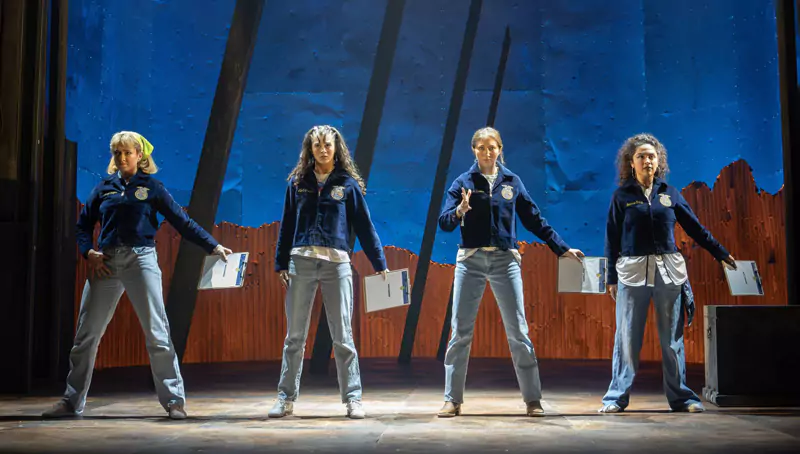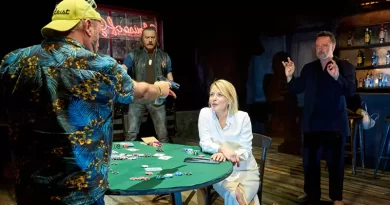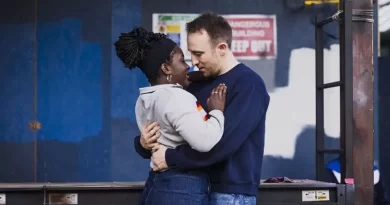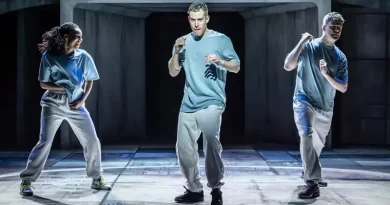“Falcon Girls” at Yale Rep
Robert Schneider in Connecticut
23 October 2024
Adolescence is a former nationality that we renounce as we emigrate to adulthood. We cringe to be reminded of our old ways in that strange land: the idols we worshipped; the coevals we tormented; the fibs we told ourselves and each other, and the many, many things we didn’t understand. Some writers keep memories of that country alive. Proust and Joyce and Wedekind could certainly do it.

Photo credit: Joan Marcus.
It’s a difficult task for theatre. Actors who can pass for adolescents on stage are often desperate to play grownups. It’s not easy for playwrights, either; they have to revisit what was said in addition to what was felt. Hilary Bettis, in a programme note to the Yale Rep inaugural production of Falcon Girls, admits to the difficulty:For most of my life, I’ve felt ashamed of who I am. I’ve felt insecure and invisible. I’ve felt that the world I grew up in, rural America, was something to denounce. Something to overcome. A punchline for the sophisticated. I was either in on the joke or I was the joke. When people started asking, “Who are you as a writer, as a woman?” I would spin my past into whatever I thought they wanted to hear. But I always felt like a liar … And so, I took a deep breath, dusted off my childhood journals, and asked my parents questions I’d been to afraid to ask. I started to see my own life, the people I love, the kids I grew up with in a new light. We were all just doing the best we could do.”
Falcon Girls casts a bright light on seven young adults growing up in Falcon, an unincorporated community northeast of Colorado Springs. The seven are members of the Falcon middle school FAA horse-judging team. They compete with other schools at county fairs all over the state. Four team members, two alternates and a “team captain” who’s little more than a glorified water boy, distributing clipboards and bottled water to the others—all girls—at the start of every competition. The team is shepherded from fair to fair by Mr. K, their teacher, driver and mentor.
The girls quiz themselves and each other on every aspect of equine culture: horse breeds, horse care, horse diseases, horse lexicon and horse riding. But the girls also goof off, quarrel, fantasize, flirt and exchange secrets as 14-year-olds will. Jasmine considers herself engaged to someone she’s had phone sex with but never met. Carly frets and pulls her hair out. April counts on a career in Hollywood. Mary, who’s evangelical, struggles against the temptation to listen to Salt-N-Pepa on her compact disk player. Rebecca chafes under pressure from her mother who seeks long-deferred recognition through her daughter. Hilary, the playwright’s alter ego, dreads being “the new girl” when she joins the school in mid-year. Dan, the “team captain,” is clueless about how to make Hilary—or any other girl—want him for a boyfriend. They know each other’s shortcomings well and can be very cruel to each other when the team loses, as it often does.

Photo credit: Joan Marcus.
One of the beauties of the situation is that competitive horse judging requires the girls to look sharp and address the judges formally and with confidence. In short, it requires them to act the adults they’re only fitfully becoming. Every victory in horse judging is a victory over the stresses and uncertainties of their awkward time of life. We want to extend a hand to the stage and pull them gently forward to a more settled age.
There’s also a dark side: from offstage we hear the voices of a brutal stepfather and scolding, disengaged parents. Worse yet, the town lives with the knowledge that a 13-year-old girl was abducted and murdered a few years back. Her remains went undiscovered for two years; the murderer might be someone in the community … Hilary’s mom binge-watches local news when she’s not working the hospital emergency room. Her interaction with her daughter consists largely of exhortations to keep the door locked and not talk to strangers.
Finally, America’s current imbroglio over abortion access comes front and centre as we witness the catastrophe of pregnancy in young teens.
A mighty counterweight to the girls’ angst and impulsiveness is Mr. K, their teacher and coach. He deftly parries a romantic overture from Carly, keeps the team grounded as they mourn their losses—especially losses to their hated rivals at Peyton Junior High—and, in his best moment, has a heart-to-heart talk with Mary who is being pulled from the public school because her parents finally found the Salt-N-Pepa CD. Mary confesses that curiosity made her listen to “the Devil’s music”, to which Mr. K responds:
I don’t wanna undermine your parents
but in my humblest human opinion
and I’m wrong a lot, Mary
I’m wrong a lot
so take this with a grain of salt
…
I think curiosity’s a good thing
people are scared of it
because when a person’s curious
they ask questions
they want to explore and learn
and they might come to believe something different
than what they’ve been taught
and I think that’s a good thing
…
but I’m wrong all the time
all the time
so you should only take this as one man’s opinion
We feel him walking a tightrope between his own convictions and the fanaticism of Mary’s parents. When Mary replies, “I’ll pray on it …” we sense that Mr. K’s intelligence and discretion have won him the greatest victory that circumstances allowed.
Carly’s unexplained withdrawal and Mary’s home schooling give Hilary, hitherto an alternate, a chance to join the team—which is now headed to the state championship. The lights (by Kyle Stamm) and sound (by Joyce Ciesil) pump us up for the occasion as the cast executes a dance number exactly as enthusiastic 14-year-olds would, no better, no worse. I scarcely noticed Micah Ohno’s costumes, so they must have been spot-on.
The entire production at Yale Rep is superb. Set designer Beowolf Boritt has created a cosmic tribunal out of barn boards and pieces of hanging tack. The actors playing the young’uns, Annie Abramczyk as Rebecca, Juan Sebastián Cruz as Dan, Alexa Lopez as April, Gabriela Veciana as Jasmine, Alyssa Marek as Carly, Gabrielle Policano as Hilary, and Anna Roman as Mary form a seamless ensemble whose virtuosity shines in rapid-fire cadenza of overlapping and echoing phone calls that unite the team after a defeat. Teddy Cañez as Mr. K presents that rarity in modern American plays, an adult male who is not corrupt, not stupid and far from indifferent to the young people in his charge. Hilary’s mom, played by Liza Fernandez, also comes through for her daughter when Hilary’s anger and resentment make it difficult to do so. In a display of versatility, Cañez and Fernandez also supply the offstage voices of the abusive and scolding adults who torment the team.
With Falcon Girls, Hilary Bettis has taken a deep draught of the waters of memory, delving into her past with unusual courage and frankness. It’s a love letter to the girls she grew up with and the horses that saved their lives. At Yale Rep, director May Adrales has signed her own love letter with this production. Falcon Girls tells a story of young people who study an arcane discipline of horse judging and so learn to judge themselves less harshly.









